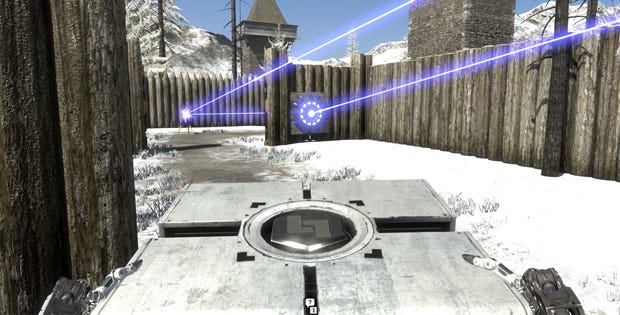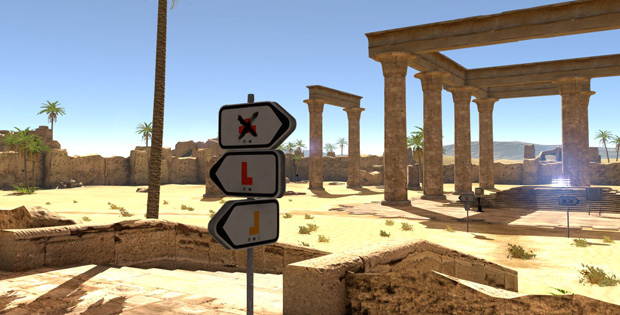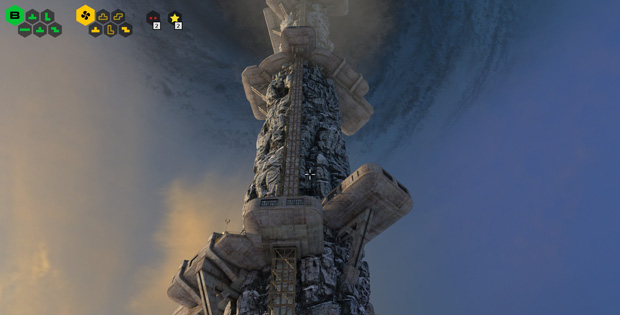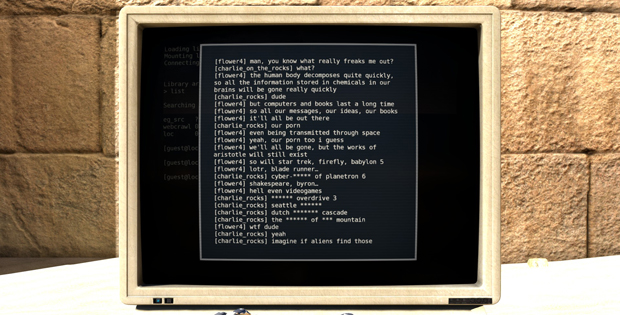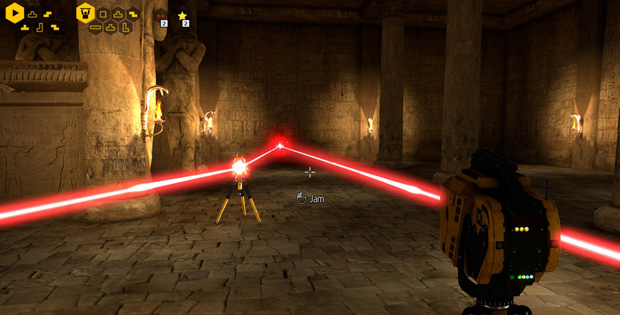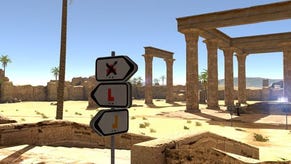Wot I Think: The Talos Principle
Me, myself and AI
Croteam's The Talos Principle has a combination of neatly designed puzzles and philosophical pondering. It tickled my brainbuds and got inside my head in that way which sees you drawing diagrams of levels while on the tube or puzzling them out as you lie in bed pretending sleep might turn up at any moment. It's one of my favourite games from 2014.
The game breaks neatly into two parts: there's the Portal-esque first person puzzle element where you figure out how to reach and collect tetromino puzzle pieces which are used to advance you through the world; there's also a philosophical/existential aspect which gradually feeds you scraps of text from a corrupted archive and asks you to consider things like the nature of consciousness and what it means to be human.
I'll talk about the puzzles first.
The game world is divided into zones. If it was the Crystal Maze they would probably be Mediterranean, Desert, Ecclesiastical and Big Hulking Tower. Each zone contains a number of doors which take you through to mini hubs where you access the puzzles themselves. The tower is slightly different but we'll get to that later.
In each puzzle you need to pick up a floating tetromino piece, gated off in a hard-to-reach location and protected by an assortment of deadly sentry guns, patrolling jerks sensor orbs, forcefield gates, locked doors and so on. At your disposal you have a small toolkit. There are crystals which let you redirect laser beams, pressure plates which switch off forcefields, fans and signal jammers. Later you'll get access to more complex tools like recording devices and persistent platforms you can carry around using clones.
The obvious comparison, as I mentioned earlier, is Portal but Talos also invokes other puzzlers – the recording mechanic has a lot of P.B. Winterbottom about it, for example.
The Talos Principle's puzzles are great. They start off pretty simple so I whooshed through most of the first zone without any level causing particular head-scratching. Getting into the second world they began to feel meatier and you'll start needing to chip away at problems, experimenting with different ways of thinking and sometimes even leaving the level completely so you can come back later with a fresh plan of attack.
Some of the later puzzles made for much glaring and brooding as I slurped a cup of tea and tried to work out how to manipulate the cubes, crystals and timey-wimey stuff to feed my tetromino habit. Not all of the later levels are that difficult, though, and I breezed through some of them. I'm wondering if they were intended as rest stops almost - opportunities to solve something while waiting for harder puzzles to swim into focus - but it did make those simpler levels feel inconsequential on occasion.
There's a hint system if you get truly stuck but I'm not sure how much people are likely to use it. The hints are unlocked in little sanctuary sections, which I liked – so much so I didn't want to leave the peace of the space – but in terms of play, it's a lot of work to unlock a single clue and they're only available once you've opened the third world. I'd say you're more likely to look up a walkthrough online than use them.
The tetrominos which you collect are used to unlock more skills for your toolkit as well as opening up new worlds to explore and providing access to the aforementioned Big Hulking Tower.
Is that the Big Hulking Tower you've been told not to go anywhere near on pain of losing your immortality? Yes. Yes it is. Hello, videogame reverse psychology!
The warning comes via a booming disembodied voice which calls itself Elohim – Hebrew for god or God. There's an overbearing paternal flavour to Elohim which clearly echoes particular interpretations of God. As a counterpoint to Elohim you have access to library terminals peppered through the world. These dispense snippets of texts from the real world (or at least, one apparently existing outside the one you're exploring). There's philosophy, fictional blog entries, emails, literature to read as well as existential questioning at the hands of an AI library assistant.
It's not easygoing material – certainly not if you're looking for light relief after butting up against a difficult level – but I found it engaging and rewarding. The variation of the types of material kept my interest from flagging and the AI was posing questions I enjoy thinking about. There were moments where it did lose me, particularly when the set of responses available didn't seem to make sense or follow the logic of what was said. For example, there was a question which I happened to have given a lot of thought to outside the game. When trying to explain it to the AI using the options available I ended up in a situation where I either had to admit to being wrong and choose another response or pursue a point which was then framed as not making sense.
Working back from the game's conclusion there's a chance this was deliberate but when actually playing it's jarring and gets in the way of seriously considering some of the subject matter being offered up. The relationship with Elohim has notes of The Stanley Parable about it. Not in terms of how it plays out specifically, but the central question of whether you're going to defy or obey the game's God figure.
Tonally, I'd say it's similar to what I've played of The Swapper which isn't surprising since the writer of that game, Tom Jubert, is also one of the writers on The Talos Principle. He's joined by Jonas Kyratzes who penned The Infinite Ocean – another game whose existential themes have echoes in Talos.
The philosophical side of the game won't be for everyone, and you can largely leave it alone or skim the texts if you really don't get on with it. I really enjoyed digging into the archives so I'd recommend giving it a good go, but ultimately it shouldn't get in the way of enjoying the excellent puzzle side of things.
The one thing I would say is that the game is pricey to the point of being off-putting, certainly to at least one friend. It's £29.99 full price on Steam (pre-orders get you a slight discount). I think it's worth it and got about 12-15 hours of playtime out of it so far (obviously some of that was disgruntled tea slurping/glaring or taking a soothing Beyoncé dance break). I'll also return to finish off some bits - bonus stars and the like. At the moment, though, there's a free public test which offers a selection of three puzzles so you can try them out beforehand as well as Sigils of Elohim which has a selection of tetromino puzzles to play around with. Do that if you're umming and erring about whether the game is worth £30 to you.
[UPDATE: Edited that last para slightly so you know how long I've played and so on!]
